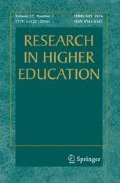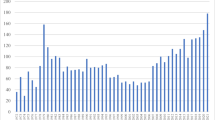Abstract
The purpose of the study is to map global research in international higher education. Specifically, the study uses bibliometric and social network analysis methods to identify key individuals, institutions, countries, and disciplines contributing to research in international higher education and to investigate patterns of connectivity among authors, journals, disciplines, and topics. The dataset representing research covers 2302 publications from the Web of Science for the period 2002–2011. Unlike prior attempts to draw a representative sample of articles capturing key research in international higher education by choosing articles from key journals, this study sampled articles more broadly by applying a keywords search to all journals included in the bibliographic database. To address the ambiguity in defining the boundaries of the field, the keywords used in constructing the dataset were generated from an explicit definition of “research in international higher education” with the definition being U.S.-centric, i.e. defining the field from the perspective of a U.S.-based researcher. Results indicated that although the number of research studies on international higher education has grown from 68 in 2002 to 472 in 2012, networks among researchers of higher education continue to operate largely within national borders and are still dominated by a few Western countries. While the 3362 researchers in international higher education came from 1164 different institutions/organizations around the world, only 11.3 % of articles were authored by researchers from at least two countries.



Similar content being viewed by others
Notes
The process of data cleaning in Vantage Point is largely automated. A fuzzy-matching approach is used to determine whether slight differences in spelling of names of institutions or authors represent different names or the same organization or individual. When applying the fuzzy matching capability of the software, we compared names of individuals with organizations that they represented. One of the drawbacks of this approach is that the same individual who has transitioned from one institution to another would be treated as two different individuals. The researchers’ expectation was that within a ten-year period not many such transitions would have taken place, so the effect of the drawback is not likely to change the results.
References
Altbach, P. G. (2009). Higher education: An emerging field of research and policy. In R. M. Bassett & A. Maldonado (Eds.), International organizations and higher education policy: Thinking globally, acting locally? (pp. 9–25). New York, NY: Routledge.
Budd, J. M. (1990). Higher education literature: Characteristics of citation patterns. The Journal of Higher Education, 61(1), 84–97.
Budd, J. M., & Magnuson, L. (2010). Higher education literature revisited: Citation patterns examined. Research in Higher Education, 51(3), 294–304.
Clark, B. R. (1986). The higher education system: Academic organization in cross-national perspective. Barkeley, CA: University of California Press.
Horn, A. S., Hendel, D. D., & Fry, G. W. (2007). Ranking the international dimension of top research universities in the United States. Journal of Studies in International Education, 11(3–4), 330–358.
Horta, H., & Jung, J. (2013). Higher education research in Asia: A scientometric perspective. Higher Education Quarterly, 67(4), 398–419.
Hutchinson, S. R., & Lovell, C. D. (2004). A review of methodological characteristics of research published in key journals in higher education: Implications for graduate research training. Research in Higher Education, 45(4), 383–403.
Jung, J., & Horta, H. (2013). Higher education research in Asia: A publication and co-publication analysis. Higher Education Quarterly, 67(4), 398–419.
Kuh, G. D., Bean, J. P., Bradley, R. K., Coomes, M. D., & Hunter, D. E. (1986). Changes in research on college students published in selected journals between 1969 and 1983. The Review of Higher Education, 9(2), 177–192.
Kuh, G. D., & Bursky, M. (1980). Knowledge dissemination by publication in student affairs: Who publishes what where? Journal of College Student Personnel, 21(5), 387–393.
Kuzhabekova, A. (2011). Impact of co-authorship strategies on research productivity: A social-network analysis of publications in Russian cardiology. ProQuest, UMI Dissertation Publishing. (UMI No. 873550952), Retrieved September 2, 2013, from ProQuest Dissertations & Theses.
Kuzma, J., & Kuzhabekova, A. (2011, September). A window into the field of biotechnology risk analysis: A bibliometric approach. Paper presented at the Atlanta conference on science and innovation policy 2011, Atlanta, GA. Retrieved September 26–28, 2011 from https://smartech.gatech.edu/handle/1853/42455.
Milam, J. H, Jr. (1991). The presence of paradigms in the core higher education journal literature. Research in Higher Education, 32(6), 651–668.
Observatoire des Sciences et de Techniques (2009). Methodological note: Bibliometrics as a tool for the analysis of the scientific production of a country. ESTIME. Retrieved April 20th, 2015 from http://www.estime.ird.fr/article268.html.
Sakamoto, R., & Chapman, D. W. (Eds.). (2010). Cross-border partnerships in higher education: Strategies and issues. New York, NY: Routledge.
Silverman, R. J. (1985). Higher education as a maturing field? Evidence from referencing practices. Research in Higher Education, 23(2), 150–183.
Thomson Reuters (2012.). Web of science. Retrieved from http://thomsonreuters.com/products_services/science/science_products/a-z/web_of_science/.
Tight, M. (1999). Writing in British higher education journals 1993–1998: Concerns and omissions. Higher Education Review, 31(3), 27–44.
Tight, M. (2003). Researching higher education. Maidenhead, England: Society for Research into Higher Education & Open University Press.
Tight, M. (2008). Higher education research as tribe, territory and/or community: A co-citation analysis. Higher Education, 55(5), 593–605.
Tight, M. (2012a). Higher education research 2000–2010: Changing journal publication patterns. Higher Education Research & Development, 31(5), 723–740.
Tight, M. (2012b). Levels of analysis in higher education research. Tertiary Education and Management, 18(3), 271–288.
Tight, M. (2013). Discipline and methodology in higher education research. Higher Education Research & Development, 32(1), 136–151.
Tight, M. (2014). Working in separate silos? What citation patterns reveal about higher education research internationally. Higher Education, 68(3), 379–395.
Volkwein, J. F., Carbone, D. A., & Volkwein, E. A. (1988). Research in higher education: Fifteen years of scholarship. Research in Higher Education, 28(3), 271–280.
Walsh, W. B., Passons, W. R., & Pritchard, M. C. (1969). Publishing patterns in the journal of college student personnel. Journal of College Student Personnel, 11(6), 403–407.
Weiler, H. N. (2008). Keyword: International research on higher education scholarship between policy and science. Zeitschrift für Erziehungswissenschaft, 11(4), 516–541.
Author information
Authors and Affiliations
Corresponding author
Appendix
Appendix
Set 1
(TS = (((“higher education” or “post-secondary education” or “university education” or “college education” or “tertiary education”) near (“in transition” or reform)) not (America* or US orUSA) not (“secondary education” or “primary education” or “basic education” or “elementary education” or “early childhood education” or “preschool education” or “school” or “teacher”))).
Set 2
(TS = (((comparative or international* or “cross* border*” or global* or world or comparative) near (“higher education” or “post-secondary education” or “university education” or “college education” or “tertiary education”)) not (“secondary education” or “primary education” or “basic education” or “elementary education” or “early childhood education” or “preschool education” or “school” or “teacher”)))
Set 3
(TS = (((“higher education” or “post-secondary education” or “university education” or “college education” or “tertiary education”) and ((*AFRICA* not African-American) or Algeria* or Angola* or Benin* or Botswana* or Burkina* or Burundi* or Cameroon* or “Cape Verde*” or Chad* or Comoros* or Congo* or Djibouti* or Egypt* or “Equatorial Guinea*” or Eritrea* or Ethiopia* or Gabon* or Gambia* or Ghana* or Guinea* or Guinea-Bissau* or “Ivory Coast*” or Kenya* or Lesotho or Liberia* or Libya* or Madagascar* or Malawi* or Mali* or Mauritania* or Mauritius* or Morocco* or Mozambique* or Namibia* or Niger* or Rwanda* or “Sao Tome and Principe*” or Senegal* or Seychelles* or “Sierra Leone*” or Somalia* or *Sudan* or Swaziland* or Tanzania* or Togo* or Tunisia* or Uganda* or Zambia* or Zimbabwe* or (*ASIA* not Asian-American) or Afghan* or Bahrain* or Bangladesh* or Bhutan* or Brunei* or Burma* or Myanmar* or Cambodia* or China* or Chinese or “East Timor*” or India* or Indonesia* or Iran* or Iraq* or Israel* or Japan* or Jordan* or Kazakhstan* or Korea* or Kuwait* or Kyrgyz* or Laos* or Lebanon* or Malaysia* or Maldives or Mongolia* or Nepal* or Oman* or Pakistan* or Philippine* or Qatar* or Russia* or “Saudi Arabia*” or Arab* or “Middle East*” or Singapore* or “Sri Lanka*” or Syria* or Tajik* or *Soviet or Thailand or Thai* or Turkey or Turkish or Turkmen* or “United Arab Emirates” or UAE or CIS or “Newly independent” or Uzbek* or Baltic or Vietnam* or Yemen* or *EUROPE* or EU or Bologna or Albania* or Andorra* or Armenia* or Austria* or Azerbaijan* or Belarus* or Belgium* or Bosnia* or Herzegovina or Bulgaria* or Croatia* or Cyprus or Czech* or Denmark or Danish or Estonia* or Finland or Finnish or France or French or Georgia* or German* or Greece or Greek or Hungary or Hungarian or Iceland* or Ireland* or Irish or Italy* or Italian or Latvia* or Liechtenstein* or Lithuania* or Luxembourg or Macedonia* or Malta* or Moldova* or Monaco* or Montenegro* or Netherlands* or Holland* or Dutch or Norway or Norwegian or Poland* or Polish or Portugal* or Portuguese or Romania* or “San Marino*” or Serbia* or Slovak* or Slovenia* or Spain or Spanish or Sweden* or Swedish or Switzerland* or Swiss or Ukraine* or “United Kingdom” or UK or Britain or British or Vatican* or “North America*” or Antigua* or Barbuda* or Bahamas* or Barbados* or Belize* or Canada* or Canadian or “Costa Rica*” or Cuba* or Dominica* or “El Salvador*” or Grenada* or Guatemala* or Haiti* or Honduras or Jamaica* or Mexico or Mexican or Nicaragua* or Panama* or “Saint Kitts and Nevis” or “Trinidad and Tobago” or OCEANIA* or Australia* or Fiji* or Kiribati* or “Marshall Islands” or Micronesia* or Nauru* or “New Zealand*” or Palau* or “Papua New Guinea*” or Samoa* or “Solomon Islands” or Tonga* or Tuvalu* or Vanuatu* or ((“South AMERICA*” or “Latin America*”) not Hispanic) or Argentina* or Bolivia* or Brazil* or Chile* or Chilean or Colombia* or Ecuador* or Guyana* or Paraguay* or Peru* or Surinam* or Uruguay* or Venezuela* or “developing country*” or “developing world” or “third world”)) not (“secondary education” or “primary education” or “basic education” or “elementary education” or “early childhood education” or “preschool education” or “school” or “teacher”)))
Rights and permissions
About this article
Cite this article
Kuzhabekova, A., Hendel, D.D. & Chapman, D.W. Mapping Global Research on International Higher Education. Res High Educ 56, 861–882 (2015). https://doi.org/10.1007/s11162-015-9371-1
Received:
Published:
Issue Date:
DOI: https://doi.org/10.1007/s11162-015-9371-1




